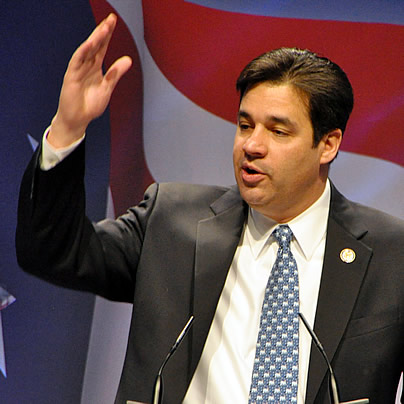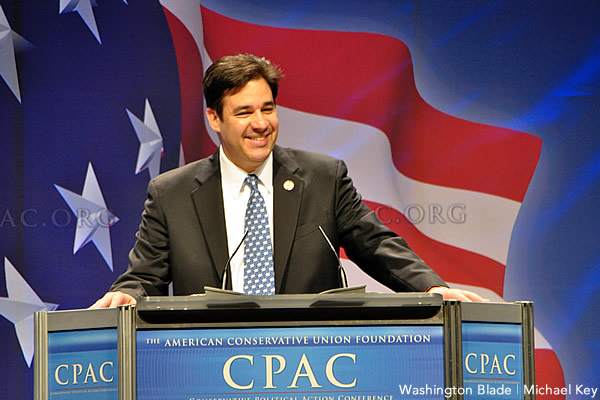Politics
Anti-gay marriage bill draws ire of LGBT advocates
Legislation could undermine advances made after court ruling against DOMA


Rep. Raúl Rafael Labrador (R-Idaho) has introduced the Marriage and Religious Freedom Act (Washington Blade file photo by Michael Key).
A new bill that aims to protect organizations that oppose same-sex marriage is invoking the ire of LGBT advocates, who call it subterfuge to undermine advances in marriage equality made in the past year.
Rep. Raul Labrador (R-Idaho), a Tea Party Republican, on Thursday introduced the Marriage and Religious Freedom Act, which is purportedly aimed to prohibit discrimination in the tax code against organizations that exercise “religious conscience” against same-sex marriage.
“Regardless of your ideology, we can all agree about the importance of religious liberty in America,” Labrador said. “Our bill will protect freedom of conscience for those who believe marriage is the union of one man and one woman. This is not a Republican or Democrat issue.”
The legislation enjoys bipartisan support right off the bat. Among the 60 original co-sponsors are Reps. Steve Scalise, chair of the Republican Study Committee as well as conservative Democrats Rep. Mike McIntyre (D-N.C.) and Rep. Dan Lipinski (D-Ill.).
Others co-sponsors are Republicans well-known for their anti-gay views: Reps. Vicky Hartzler (R-Mo.), Louie Gohmert (R-Texas), Jim Jordan (R-Ohio) and Michele Bachmann (R-Minn.).
According to the Labrador statement, most religious institutions fall within the 501(c) portion of the U.S. tax code, which allows for tax exemption. Further, the statement contends if the bill were passed, no individual or institution that opposes marriage equality would lose that exemption for purposes of federal taxes.
An array of conservative organizations and religious groups have endorsed the legislation, including the U.S. Conference of Catholic Bishops, the National Organization for Marriage, Family Research Council, and the Ethics & Religious Liberty Commission of the Southern Baptist Convention.
The bill is introduced following the controversy that ensued after the Internal Revenue Service apologized for targeting political groups with closer scrutiny based on names or political themes if they applied for tax-exempt status.
LGBT advocates responded to the introduction of the bill by saying it would rescind protections that married same-sex couples have received in the wake of the Supreme Court decision against the Section 3 of the Defense of Marriage Act.
Evan Wolfson, president of Freedom to Marry, called the bill “a sweeping Trojan Horse proposal” that would undermine constitutional protections.
“Decades of civil rights struggle, and long experience with both federal and state non-discrimination statutes, have made clear that we don’t need to gut non-discrimination laws to protect true religious freedom, and neither private religious views nor prejudice should get a special license to discriminate in the public sphere,” Wolfson said.
Freedom to Marry identified repercussions of the bill that it says are particularly “egregious”:
* Allowing businesses to refuse to provide Family & Medical Leave Act leave for the same-sex spouse of an employee to care for a sick loved one and to deny pension protections to married same-sex couples.
* Allowing federal employees to refuse to process the tax returns or Social Security claims of married same-sex couples.
* Allowing individuals to pick and choose whether they want to comply with federal laws, simply by invoking religious views.
Lanae Erickson Hatalsky, a lesbian and the Third Way’s director of social policy and politics, also said the bill presents more problems than simply protecting the tax status of religious organizations.
“The sponsors and press clips so far have focused on the idea of protecting churches and religious organizations from losing their tax status due to their views on marriage for gay couples (something that hasn’t ever been an issue), but the effect of the bill would actually be much broader and incredibly problematic,” Erickson Hatalsky said.
Among the problems with the bill that Erickson Hatalsky identified are a potential violation of the Establishment Clause under the First Amendment as well as contravening the Bush-established policy of “Charitable Choice”, which says that when a program is federally funded, a religious organization may not turn people away.
Further, Erickson Hatalsky said the bill as written isn’t just limited to married same-sex couples, but would allow federal beneficiaries to discriminate against anyone who’s had sexual relations outside of an opposite-sex marriage.
“That means a government-funded health clinic could be able to refuse to provide prenatal care to an at-risk pregnant woman because she is unmarried,” Erickson Hatalsky said. “Again, that goes against our longstanding principle that when taxpayer funds are involved, an organization must serve all comers.”
2026 Midterm Elections
LGBTQ Victory Fund looks beyond Washington for change in 2026
Vice President of Political Programs Daniel Hernández spoke with Blade

As the Trump-Vance administration enters its second year, LGBTQ people from around the country are running for public office amid fears of the removal of federal civil rights laws that could lead to rollbacks in protections.
The Washington Blade sat down with Daniel Hernández Jr., the newly made vice president of political programs for the LGBTQ Victory Fund, a nonpartisan political action committee dedicated to electing openly LGBTQ individuals to all levels of government, to discuss why now is more important than ever to actualize LGBTQ political power.
Hernández is often credited with saving the life of then-U.S. Rep. Gabrielle Giffords (D-Ariz.) while working as her 20-year-old intern in Tucson, Ariz., in 2011. He served on the Pima County School Board and in the Arizona House of Representatives from 2017-2023, advocating for LGBTQ rights, healthcare access, and education.
Founded in 1991, the Victory Fund was created by a group of prominent LGBTQ political voices, including Dallas gay rights activist William Waybourn and former Human Rights Campaign Fund Executive Director Vic Basile, who were inspired by the success of EMILY’s List, a PAC that works to elect Democratic women to office.
Since its founding, the Victory Fund has worked with LGBTQ advocates and LGBTQ-supportive donors who recognized the need to prepare LGBTQ people to run for office nationwide.
When asked where LGBTQ people and allies need to focus looking ahead, Hernández emphasized that 2026 will be won or lost at the state and local level.
“One of the bigger things that people may not be paying as close attention to as we really should is the impact of state and local races. Federal races are crucial, obviously, but the folks who are actually able to have an impact in a meaningful way right now are not the people in the U.S. House or Senate,” Hernández said. “It can take years before a bill even moves through Congress. Meanwhile, state and local leaders are the ones standing up and fighting for our rights today. Especially during this Trump administration, that’s where the real action is happening.”
He expanded on that point, saying that at this moment in the U.S. political landscape, statewide races matter far more than they are often given credit for — particularly as 2026 is a midterm year under President Donald Trump. People who win elected office in midterm years, Hernández explained, are many times viewed as legislators pushing back against the administration at the top.
“Looking at 2026 in particular, because it’s a midterm year, people sometimes forget just how many critical statewide races are on the ballot. We have people like Chris Mayes in Arizona, who won by less than 300 votes in a battleground state and is now running for reelection,” he said. “These are the races that protect democracy and protect people’s rights in real time. If we ignore them, we’re doing so at our own peril. Statewide offices are where so much power actually lives.”
Hernández also urged LGBTQ voters and donors to think critically about where their time, money, and energy are going — particularly as resources remain limited heading into 2026 and not every race is winnable.
“I think one thing we don’t do enough as a community is pause and ask whether our resources are actually going where they can have an impact. If someone is running against a Republican in a plus-20 Republican state that hasn’t elected a Democrat in decades, do I really need to give my limited resources there? Or does it make more sense to support candidates in competitive states like Arizona or Wisconsin? In 2026, we have to be more strategic, because our resources are not unlimited. Winning matters.”
That calculation, Hernández said, also means moving away from what he described as emotionally driven donations and toward a more deliberate strategy.
“Our community is incredible at rallying when we’re angry, and I call that ‘rage giving.’ Someone awful is in office, a challenger pops up, and we all open our wallets. But what we really need to be doing is asking where that money will actually move the needle. In 2026, it’s not enough to feel good about donating — we have to make sure those donations help candidates who can realistically win. That’s how we protect LGBTQ rights long term.”
Asked how the Victory Fund determines which candidates receive endorsements — especially amid a growing field of openly LGBTQ contenders — Hernández emphasized that viability is central to the organization’s approach in 2026.
“One of the things we’re really focused on in 2026 is viability. We’re not endorsing people who have a zero-percent chance of winning. We’re looking at candidates who are running strong campaigns, who have plans, who are fundraising, and who are doing the work. That’s important because our community deserves guidance it can trust. When you see a Victory endorsement, it means we believe that candidate can actually win.”
Hernández also pushed back on the long-standing notion that being openly LGBTQ is a political liability — an argument that has resurfaced amid right-wing attacks on LGBTQ candidates.
“There’s been this long-standing perception that being LGBTQ is a liability and that it can cost Democrats elections. But when you actually look at the data, that just isn’t true. The reality is that being LGBTQ is not a risk — it’s often a strength. Voters care about roads, health care, affordability, and jobs, not fear-based caricatures. In 2026, we’re seeing more LGBTQ candidates than ever because people understand that now.”
That shift, he added, has helped reframe what LGBTQ candidates are actually campaigning on — despite efforts by conservatives to reduce them to culture-war issues.
“The so-called ‘gay agenda’ is not bathrooms. It’s making sure people have access to health care, that roads are safe, and that families can afford to live. LGBTQ candidates are talking about the same bread-and-butter issues as everyone else. That’s why the idea that LGBTQ candidates cost elections just doesn’t hold up. In fact, we’re seeing them lead on some of the most important issues facing voters right now.”
As misinformation and fear-based narratives continue to dominate right-wing messaging, Hernández said openly LGBTQ elected officials play a crucial role in countering those attacks — both through policy and presence.
“First and foremost, any elected official’s responsibility is to their constituents. That’s what we’re seeing from LGBTQ officials who are focused on affordability, health care access, and consumer protections while Republicans obsess over culture-war nonsense,” Hernández said. “But there’s also a responsibility to be authentic. Being honest about who you are and why you fight matters. That authenticity cuts through fear-based disinformation.”
Looking ahead to 2026, Hernández pointed to transgender elected officials as a particular source of momentum and optimism, even amid intensified political attacks.
“Our trans elected officials are honestly at the forefront of some of the biggest battles we’re facing right now. Despite relentless attacks and vilification, they are still delivering results for their communities. That tells me something incredibly powerful about where the country is headed. Even in this political climate, trans leaders are winning and governing. That gives me a lot of hope for 2026.”
Ultimately, Hernández said the stakes of the upcoming cycle extend far beyond a single election, shaping the future of LGBTQ political leadership nationwide.
“The leaders we elect at the state and local level today are the members of Congress and senators of tomorrow. People don’t just wake up one day and run for Congress — they come from city councils, state legislatures, and school boards. That’s why 2026 is so important. If we invest now, we’re not just defending our rights in the moment, we’re building the next generation of LGBTQ leadership.”
Victory Fund’s endorsed candidates
Incumbents Endorsed: January 2026
- Helen Grant (they/them) – Norman City Council, Ward 4, Okla.
- Louie Minor (he/him) – Bell County Commission, Precinct 4, Texas
- Jonathan West (he/him) – Manchester Selectboard, Vt.
- George Leach (he/him) – Court of Common Pleas, Franklin County Judge, Ohio
- John Fredrickson (he/him) – Nebraska State Senate, District 20
- Ben Bowman (he/him) – Oregon House of Representatives, District 25
- Jeffrey Prang (he/him) – Los Angeles County Assessor, Calif.
- Amie Carter (she/her) – Sonoma County Superintendent of Schools, Calif.
- Elinor Levin (she/her) – Iowa House of Representatives, District 89
- Ken Carlson (he/him) – Contra Costa County Supervisor, District 4, Calif.
- Emma Pinter (she/her) – Adams County Commission, District 3, at-large, Colo.
- Justin Chenette (he/him) – York County Commission, District 3, Maine
- Kris Fair (he/him) – Maryland House of Delegates, District 3
- Jennifer Cornell (she/her) – Ann Arbor City Council, Ward 5, Mich.
- Darlene Martinez (she/her) – Constable, El Centro – Downtown Phoenix, Ariz.
- Brian Garcia (he/him) – Arizona House of Representatives, District 8
- Christian Phelps (he/him) – Wisconsin State Assembly, District 93
- Jack Patrick Lewis (he/him) – Massachusetts House of Representatives, 7th Middlesex
- Will Brownsberger (he/him) – Massachusetts State Senate, Suffolk and Middlesex Counties
- Julian Cyr (he/him) – Massachusetts State Senate, Cape & Islands District
- CM Hall (she/they) – Newport City Council, Ore.
- Jimmy Mack (he/him) – Southampton Town Trustee, N.Y.
- Michael Vargas (he/him) – Elk Grove USD Board of Education, Area 2, Calif.
- Lisa Grafstein (she/her) – North Carolina State Senate
- Hector Bustos (he/him) – Trustee, Santa Ana Unified School District, Calif.
Newly Endorsed Candidates – January 2026
- Kirk McPike (he/him) – Virginia House of Delegates, District 5
- Winn Decker (he/him) – North Carolina House of Representatives, District 37
- Jonathan Lambert-Melton (he/him) – Wake Co. Board of Commissioners, At-Large, N.C.
- Karen Stegman (she/her) – Orange County Board of Commissioners, At-Large, N.C.
- Landon Campbell (he/him) – Hays County Criminal District Attorney, Texas
- Christine Castillo (she/her) – Bexar County District Clerk, Texas
- Nicholas “Nico” Costilla (he/him) – Hays County Clerk, Texas
- Davis Mendoza Darusman (he/him) – Harris Co. Justice of the Peace, Pct. 5, Pl. 2, Texas
- Nicholas Palmer (he/him) – Justice, Fifth Court of Appeals, Texas
- José “Che-Che” Wilson (he/him) – Cook County Board of Commissioners, District 12, Ill.
- Sarah Bury (she/her) – Metropolitan Water Reclamation District Board of Commissioners, Ill.
For more information of the LGBTQ Victory Fund’s endorsments, qualifications, or on how to register to receive an endorsement, visit the organization’s website at victoryfund.org
Congress
New Equality Caucus vice chair endorses Equality Act, federal trans bill of rights
Salinas talks about her personal road to LGBTQ advocacy

Rep. Andrea Salinas, the new vice chair of the Equality Caucus, sat down with the Blade to discuss the battles ahead as she demands protections for LGBTQ Americans.
Salinas is no stranger to government service. The daughter of a Mexican immigrant, she graduated from the University of California, Berkeley, and soon became a valued member of multiple Democratic offices — including working as a congressional aide to U.S. Sen. Harry Reid (D-Nev.) and U.S. Reps. Pete Stark (D-Calif.) and Darlene Hooley (D-Ore.). From there, she served six years in the Oregon House of Representatives before being elected to Congress, representing areas south of Salem and parts of southern Portland. With her new role in the Equality Caucus, Salinas vows to push protections for LGBTQ Americans in every room she enters.
The Washington Blade spoke with Salinas last week following her leadership announcement to discuss what the role means to her, why she — as a straight woman— feels it is her duty to fight for LGBTQ protections, and how she views the current state of the country.
When asked why she decided to take on a leadership role within the Equality Caucus, Salinas explained that she was already doing the work — but that the timing of the caucus’s outreach, coupled with what she described as a growing threat posed by the Trump-Vance administration, made the moment feel especially urgent.
“I was actually asked to take on this role because of the work I’ve already been doing. I didn’t seek out a title— the Congressional Equality Caucus came to me, and I was honored by that,” the Oregon representative told the Blade. “I’ve been a lifetime advocate, first as a mother and then as a legislator. With Trump back in office and the shackles off, kids are vulnerable right now, and they’re being attacked. We need champions, and with or without a title, I was going to do this work anyway.”
That work includes passing LGBTQ-related education policy during her time in the Oregon House of Representatives, requiring the Oregon Department of Education to train teachers on how to better support LGBTQ students. She also backed legislation aimed at preventing LGBTQ-related bullying and harassment, while using her platform to ensure educators had the skills needed to address trauma in the classroom. Salinas also pushed for Oregon’s 2013 conversion therapy ban and played a role in defending it.
Salinas said her personal motivation for expanding and protecting LGBTQ rights is rooted in the experiences of her daughter, Amelia.
“My daughter is queer, and she has known who she is since she was a child,” Salinas said. “She presents very masculine, and I’ve had to advocate for her her entire life — from whispers on soccer sidelines to fears about using the bathroom when she was just three or four years old. That kind of bullying and harassment stays with you as a parent. It became part of who I am, part of my ‘mama bear’ advocacy. When I entered public office, continuing that fight was the most natural thing in the world.”
That “mama bear” advocacy, she said, now extends far beyond her own family.
“Across this country, kids are vulnerable right now, and Trump is attacking them,” she said. “My daughter was devastated after the 2024 election— she said, ‘They’re coming after us,’ and she was right. That fear is real, especially for transgender youth. Civil rights should be expanding, not being stripped away from certain communities. That’s why this fight feels so urgent.”
Since returning to the White House in 2024, the Trump administration has moved to roll back anti-discrimination protections, particularly those affecting transgender people. These efforts include barring transgender people from serving openly in the military, blocking access to gender-affirming medical care in federal health programs, challenging state laws that protect transgender students on religious grounds, and arguing that the Constitution entitles employers to discriminate against LGBTQ people based on religious beliefs — even in states with nondiscrimination laws.
For Salinas, the Equality Caucus’s most urgent task under the Trump-Vance administration is advancing what she called a long-sought but non-negotiable priority: the Equality Act.
The Equality Act would add explicit protections based on sexual orientation and gender identity to federal law. Despite more than five decades of debate on Capitol Hill, no version of the bill has yet become law.
“We have to keep pushing the Equality Act— there’s no way around that. No one should be discriminated against in housing, employment, credit, or healthcare because of who they are,” Salinas said. “Republicans are making LGBTQ identity a political wedge because they think it’s expedient, and that’s unacceptable. Sexual orientation and gender identity should not matter in determining someone’s access to opportunity. Yet here we are, still having to fight for that basic principle.”
Salinas added that advancing legislation like the Equality Act requires compassion— even when that compassion is not returned— and a commitment to education.
“We have to meet people where they are— Democrats, Republicans, independents, all of them. Until you know a family, or understand someone’s lived experience, it can feel abstract and overwhelming,” she said. “Education, compassion, and empathy are essential to moving the dial. When people understand this is about human rights, not politics, conversations start to change. That’s how we build broader support.”
She also emphasized the need for a federal transgender bill of rights, which would provide explicit protections for transgender Americans amid what she described as an increasingly hostile federal environment.
“A transgender bill of rights would clarify that discrimination against transgender and nonbinary people is illegal — in employment, housing, credit, and healthcare,” Salinas said. “What’s happening right now, with efforts to criminalize doctors for providing evidence-based care, is unheard of and dangerous. We also need to ban conversion therapy nationwide, because states are increasingly trying to undo those protections through the courts. These safeguards are about ensuring people can live safely and with dignity. That should not be controversial.”
Mental health is another central focus of Salinas’s work. She said ensuring children have access to support— particularly LGBTQ youth— is critical to their long-term wellbeing.
After the Trump administration eliminated the LGBTQ-specific option from the 988 Suicide and Crisis Lifeline, Salinas said her reaction was one of outrage.
“When Trump shut down the 988 press-three option for LGBTQ youth, I was apoplectic,” she said. “It is one of the simplest, most upstream ways to save lives, and it felt arbitrary, cruel, and inhumane. We know the suicide risk among transgender youth is far higher than among non-LGBTQ kids. Connecting them with someone who understands their experience can be life-saving. This should be bipartisan, and I’m going to keep pushing to restore it.”
“You cannot be what you cannot see….” she added while reflecting on the handful of LGBTQ leaders who have— and continue to— navigate the halls of Congress to protect their community. “When Sarah McBride was elected, my daughter met with her and walked out glowing… joyful, hopeful, and excited about the future. That kind of representation changes lives. Electing LGBTQ leaders changes the trajectory for people across the country. Grassroots organizing and electoral power go hand in hand, and we need both.”
With Salinas’s experience in both the Oregon House of Representatives and the U.S. House of Representatives, she said that while one arena may reach more people, change often begins locally, especially when combating anti-LGBTQ attacks.
“I’ve seen how misinformation fuels fear at the local level— whether it’s school board fights or bathroom debates rooted in baseless claims. There is no data to support these scare tactics,” she said, echoing her past work with the Oregon Department of Education. “What actually helps is facts, education, and training teachers to better support LGBTQ students. I passed legislation in Oregon to give educators real tools to prevent bullying and harassment. That kind of work matters just as much as what we do in Congress.”
Despite just being named vice chair of the Equality Caucus, the Blade asked Salinas what legacy she hopes to leave, particularly when it comes to LGBTQ advocacy.
“I want people to be able to live authentically, without fear from their government or their neighbors. That means passing real legislation— the Equality Act and a transgender bill of rights— so protections are not dependent on who’s in power. Civil and human rights are meant to expand, not contract.
“I’ve been doing this work since I became a mother, and I’ll keep doing it for as long as it takes. My daughter deserves it, and so does every LGBTQ person in this country.”
Congress
McBride, other US lawmakers travel to Denmark
Trump’s demand for Greenland’s annexation overshadowed trip

Delaware Congresswoman Sarah McBride is among the 11 members of Congress who traveled to Denmark over the past weekend amid President Donald Trump’s continued calls for the U.S. to take control of Greenland.
McBride, the first openly transgender person elected to Congress, traveled to Copenhagen, the Danish capital, with U.S. Sens. Chris Coons (D-Del.), Thom Tillis (R-N.C.), Jeanne Shaheen (D-N.H.), Dick Durbin (D-Ill.), and Lisa Murkowski (R-Alaska) and U.S. Reps. Steny Hoyer (D-Md.), Gregory Meeks (D-N.Y.), Madeleine Dean (D-Pa.), Don Bacon (R-Neb.), and Sarah Jacobs (D-Calif.). The lawmakers met with Danish Prime Minister Mette Frederiksen and Greenlandic MP Pipaluk Lynge, among others.
“I’m grateful to Sen. Coons for his leadership in bringing together a bipartisan, bicameral delegation to reaffirm our support in Congress for our NATO ally, Denmark,” said McBride in a press release that detailed the trip. “Delaware understands that our security and prosperity depend on strong partnerships rooted in mutual respect, sovereignty, and self-determination. At a time of growing global instability, this trip could not be more poignant.”
Greenland is a self-governing territory of Denmark with a population of less than 60,000 people. Trump maintains the U.S. needs to control the mineral-rich island in the Arctic Ocean between Europe and North America because of national security.
The Associated Press notes thousands of people on Saturday in Nuuk, the Greenlandic capital, protested against Trump. British Prime Minister Keir Starmer is among those who have criticized Trump over his suggestion the U.S. would impose tariffs against countries that do not support U.S. annexation of Greenland.
A poll that Sermitsiaq, a Greenlandic newspaper, and Berlingske, a Danish newspaper, commissioned last January indicates 85 percent do not want Greenland to become part of the U.S. The pro-independence Demokraatit party won parliamentary elections that took place on March 12, 2025.
“At this critical juncture for our countries, our message was clear as members of Congress: we value the U.S.-Denmark partnership, the NATO alliance, and the right of Greenlanders to self-determination,” said McBride on Sunday in a Facebook post that contained pictures of her and her fellow lawmakers meeting with their Danish and Greenlandic counterparts.
-

 a&e features5 days ago
a&e features5 days agoMarc Shaiman reflects on musical success stories
-

 Television5 days ago
Television5 days agoNetflix’s ‘The Boyfriend’ is more than a dating show
-

 Movies5 days ago
Movies5 days ago50 years later, it’s still worth a return trip to ‘Grey Gardens’
-

 Opinions5 days ago
Opinions5 days agoSnow, ice, and politics: what is (and isn’t) happening




















